- Home
- Cecelia Ahern
Cecelia Ahern 2-book Bundle Page 6
Cecelia Ahern 2-book Bundle Read online
Page 6
Irritation and uneasiness settled in on Lou again. Unsure if Gabe was preaching or was just trying to be friendly, he quickly stole a glance at him to judge, but Gabe was just looking through the envelopes on his trolley, figuring out which floor to go to next.
‘Oh, of course I’ll go.’ Lou plastered a fake smile on his face. ‘I’ll drop in for a while, at some stage. That was always the plan.’ Lou’s voice sounded forced. Why the hell was he explaining himself?
Gabe didn’t respond and, after a few loaded seconds of silence, Lou punched the elevator call button a few times in a row.
‘These things are so bloody slow,’ he grumbled.
Finally, the doors opened and the crammed lift revealed room for only one person.
Gabe and Lou looked at one another.
‘Well, one of you get in,’ a crank barked from the lift.
‘Go ahead,’ Gabe said. ‘I’ve got to bring this down.’ He nodded at the cart. ‘I’ll get the next one.’
‘You sure?’
‘Just kiss already,’ one man called, and the rest laughed.
Lou rushed in and couldn’t take his eyes away from Gabe’s cool stare as the doors closed and the lift slowly lowered.
After only two stoppages, they reached ground level and, finding himself crammed at the back, Lou waited for everybody to unload. He watched the workers rush to the doors of the lobby for lunch, bundled up and ready for the elements.
The crowd cleared and his heart skipped a beat as he caught sight of Gabe standing by the security desk with the trolley beside him, searching the crowds for Lou.
Lou slowly disembarked and made his way towards him.
‘I forgot to leave this on your desk.’ Gabe handed him a thin envelope. ‘It was hidden beneath someone else’s stack.’
Lou took the envelope and didn’t even look at it before crushing it into his coat pocket.
‘Is something wrong?’ Gabe asked, but there was no concern detectable in his voice.
‘No. Nothing’s wrong.’ Lou didn’t move his eyes away from Gabe’s face once. ‘How did you get down here so quickly?’
‘Here?’ Gabe pointed at the floor.
‘Yeah, here,’ Lou said sarcastically. ‘The ground level. You were going to wait for the next elevator. From the fourteenth floor. Just less than thirty seconds ago.’
‘Oh yeah,’ Gabe agreed, and he smiled. ‘I wouldn’t say it was quite thirty seconds ago, though.’
‘And?’
‘And …’ he stalled. ‘I guess I got here quicker than you.’ He shrugged, then unlatched the brake at the wheel of the trolley with his foot, and prepared to move. At the same time, Lou’s phone started ringing and his BlackBerry signalled a new email.
‘You’d better run,’ Gabe said, moving away. ‘Things to see, people to do,’ he echoed Lou’s words. Then he flashed a porcelain smile that had the opposite effect to the warm fuzzy feeling it had given Lou that same morning. Instead, it sent torpedoes of fear and worry right to his heart and straight into his gut. Those two places. Right at the same time.
8.
Puddin’ and Pie
It was ten thirty at night by the time the city spat Lou out and waved him off to the coast road that led him home to his house in Howth, County Dublin. Bordering the sea, a row of houses lined the coast, like an ornate frame to the perfect watercolour. Windswept and eroded from a lifetime of salty air, they got into the great American spirit of housing giant Santas and reindeers on twinkling rooftops. Every window with open curtains twinkled with the lights of Christmas trees, and Lou recalled, as a boy, trying to count as many trees on show as possible to pass the time while travelling. To Lou’s right he could see across the bay to Dalkey and Killiney. The lights of Dublin city twinkled beyond the oily black of the sea, like electric eels flashing beneath the blackness of a well.
Howth had been the dream destination for as long as Lou could remember. Quite literally, his first memory began there, his first feeling of desire, of wanting to belong and then of belonging. The fishing and yachting port in north County Dublin was a popular suburban resort on the north side of Howth Head, fifteen kilometres from Dublin city. It was a village with history; cliff paths that led past Howth village and its ruined abbey, an inland fifteenth-century castle with rhododendron gardens, and many lighthouses that dotted the coastline. It was a busy, popular village filled with pubs, hotels and fine fish restaurants. It had breathtaking views of Dublin Bay and the Wicklow Mountains or Boyne Valley beyond. Howth was a peninsular island with only a sliver of land to attach it to the rest of the country. Only a sliver of land to connect Lou from his daily life to that of his family. A mere shred, so that when the stormy days attacked, Lou would watch the raging Liffey from the window of his office and imagine the grey ferocious waves crashing over that sliver, licking at the land like flames, threatening to cut his family off from the rest of the country. Sometimes in those daydreams he was away from his family, cut off from them forever. In the nicer moments he was with them, wrapping himself around them to shield them from the elements.
Behind their large landscaped garden was land, wild and rugged, of purple heather and waist-high uncultivated grasses and hay that looked out over Dublin Bay. To the front they could see Ireland’s Eye, and on a clear day the view was so stunning it was almost as though a green screen had been hung from the clouds and rolled down to the ocean floor. Stretching out from the harbour was a pier, that Lou loved to take walks along, though he walked alone. He hadn’t always; his love for the pier had begun when he was a child when his parents brought him, Marcia and his elder brother Quentin to Howth every Sunday, come rain or shine, for a walk along the pier. Those days were either made up of a sun so hot he could still taste the ice-cream as soon as he set foot on the pier, or were so stormy that the wind whipped with such strength they would hang on to one another to avoid being whisked off land and lost to the sea.
On those family days, Lou would disappear into his own world. For on those days he was a pirate on the high seas. He was a lifeguard. He was a soldier. He was a whale. He was anything he wanted to be. He was everything he wasn’t. For the first few moments of every walk along the pier, he would begin by walking backwards, looking at their car in the car park until the bright red colour was no longer visible and the people had turned into penguins; dark dots that waddled about the place without any defined movements.
Lou still loved walking that pier; his runway to tranquillity. He loved watching the cars and the houses perched along the cliff edges fade away as he moved further and further from land. He would stand shoulder to shoulder with the lighthouse, both of them looking out. Here, after a long week at work, he could throw all of his concerns and worries out to the water and watch them land with a plop on the waves and float down to the floor below.
But the night Lou drove home after first meeting Gabe, it was too late to walk the pier. The power button on his view was off, all he could see was blackness and the occasional standby light flashing on a lighthouse. Despite the hour and the fact it was midweek, the village wasn’t its usual quiet hideaway. So close to Christmas, every restaurant was throbbing with diners, Christmas parties and annual meetings and celebrations. All the boats would be in for the night, the seals gone from the pier, their bellies full with the mackerel purchased and thrown to them by visitors. The winding road that led uphill to the summit was black and quiet now, and, sensing that home was near and that nobody else was around, he put his foot down on the accelerator of his Porsche 911. He lowered his window and felt the ice-cold air blow through his hair, and he listened to the sound of the engine reverberating through the hills and trees as he made his way to Howth summit. Below him, the city twinkled with a million lights, spying him winding his way up the wooded mountain like a spider among the grass.
As icing on the cake to the day he had just had, he heard a whoop, and then, looking in his rear-view mirror, cursed loudly at the garda car that came up behind him, lights ablazing. H
e eased his foot off the accelerator, hoping he’d be overtaken, but to no avail, the emergency was indeed him. He indicated and pulled in, sat with his hands on the steering wheel and watched the familiar figure climbing out of the garda car. The man slowly made his way to Lou’s side of the vehicle, looking around at the night as though taking a leisurely stroll, giving Lou enough time to rack his brain for the sergeant’s name. Lou turned off the music he’d been blaring and took a closer look at the man in the wing mirror, hoping it would trigger the memory of his name.
The man parked himself outside Lou’s door and leaned down to look into the open window.
‘Mr Suffern,’ he said, without a note of sarcasm, much to Lou’s relief.
‘Sergeant O’Reilly.’ He remembered the name right on cue and threw the man a smile, showing so many teeth he resembled a tense chimpanzee.
‘We find ourselves in a familiar situation,’ Sergeant O’Reilly said with a grimace. ‘Unfortunately for you, we both head home at the same hour.’
‘Yes, indeed, sir. My apologies, the roads were quiet, I thought it would be okay. There’s not a sinner around.’
‘Just a few innocents. That’s always the problem.’
‘And I’m one of them, your honour,’ Lou laughed, holding his hands up in defence. ‘It’s the last stretch of road before getting home, trust me, I only put the foot down seconds before you pulled me over. Dying to get home to the family. No pun intended.’
‘I could hear your engine from Sutton Cross, way down the road.’
‘It’s a quiet night.’
‘And it’s a noisy engine, I know that, but you just never know, Mr Suffern. You just never know.’
‘Don’t suppose you’d let me off with another warning,’ Lou smiled, trying to work sincerity and apology into his best winning smile. Both at the same time.
‘You know the speed limit, I assume?’
‘Sixty kilometres.’
‘Not one hundred and …’
The sergeant suddenly stopped talking and bolted up to stand upright, causing Lou to lose eye contact with him and instead be faced with his belt buckle. Unsure of what the sergeant was up to, he stayed seated and looked out the window to the stretch of road before him, hoping he wasn’t about to gain more points on his licence. With twelve as the maximum before losing his licence altogether, he was perched dangerously close with eight points already. He peeked at the sergeant and saw him grasping at his left pocket.
‘You looking for a pen?’ Lou called, reaching his hand into his inside pocket.
The sergeant winced and turned his back on Lou.
‘Hey, are you okay?’ Lou asked with concern. He reached for the door handle and then thought better of it.
The sergeant grunted something inaudible, the tone suggesting a warning of some sort. Through the wing mirror, Lou watched him walk slowly back to his car. He had an unusual gait. He seemed to be dragging his left leg slightly as he walked. Was he drunk? Then the sergeant opened his car door, got back inside, started up the engine, did a u-turn and was gone. Lou frowned, his day – even in its twilight hours – becoming increasingly more bizarre by the moment.
Lou pulled up to the driveway feeling the same sense of pride and satisfaction he felt every night when he arrived home. To most average people, size didn’t matter, but Lou didn’t want to be average and he saw the things that he owned as being a measure of the man that he was. He wanted the best of everything and, to him, size and quantity were a measure of that. Despite being in a safe cul-de-sac of only a few houses on Howth summit, he’d arranged for the existing boundary walls to be built up higher and for oversized electronic gates, with cameras, at the entrance.
The lights were out in the children’s bedrooms at the front of the house, and Lou instantly felt an inexplicable relief.
‘I’m home,’ he called to the quiet house.
There was a faint sound of a breathless and rather hysterical woman calling out movements from the television room down the hallway. Ruth’s exercise DVD.
He loosened his tie and opened the top button of his shirt, kicked off his shoes, felt the warmth of the underfloor heating soothe his feet through the marble, and started to sort through the mail on the hall table. His mind slowly began to unwind, the conversations of various meetings and telephone calls all beginning to slow. Though they were still there, the voices seemed a little quieter now. Each time he took off a layer of his clothes – his overcoat flung over the chair, his suit jacket on the table, his shoes kicked across the floor, his tie onto the table but slithering to the floor, his case here, loose change and keys there – he felt the events of the day fall away.
‘Hello,’ he called again, louder this second time, realising that nobody – i.e. his wife – had come to greet him. Perhaps she was busy breathing to the count of four, as the hysterical woman in the television room was doing.
‘Sssh,’ he heard, coming from the second level of the house, followed by the creak of floorboards as his wife made her way across the landing.
This bothered him. Not the creaking, for it was an old house and not much could be done about that, but the being silenced was a problem. After a day of non-stop talking, of clever words of jargon, persuasion and intelligent conversation, deal opening, deal development and deal closing, not one person he had met with had at any point told him to Sssh. This was the language of teachers and of librarians. Not of adults in their own homes. He felt like he’d left the real world and entered a crèche. After only one minute of stepping through his front door, he felt irritated. That had been happening a lot lately.
‘I’ve just put Pud down again. He’s not having a good night,’ Ruth explained from the top of the stairs, in a loud whisper. This kind of speech, though Lou understood, he did not like. Like the Sssh language, this adult-whispering was for children in class or teenagers sneaking out of or into their homes. He didn’t like limitations, particularly in his own home. So that irritated him too.
The ‘Pud’ she referred to was their son Ross. A little over a year old now, he still held on to his baby fat, his flesh resembling the uncooked dough of a croissant or that of a pudding. Hence the nickname Pud, which, unfortunately for the already christened Ross, seemed to be sticking around.
‘What’s new?’ he mumbled, referring to Pud’s lack of desire to sleep, while searching through the mail for something that didn’t resemble a bill. He opened a few and discarded them on the hall table. Pieces of ripped paper drifted from the surface and onto the floor.
Ruth made her way downstairs, dressed in a velour tracksuit-cum-pyjamas outfit, he couldn’t quite tell the difference between what she wore these days. Her long brown chocolate hair was tied back in a high ponytail and she shuffled towards him in a pair of slippers – the noise grating on his ears, worse than the sound of a vacuum cleaner, which, until that point, had been his least loved.
‘Hi,’ she smiled, and the tired face disappeared and there was a glimpse, a tiny flicker, of the woman he had married. Then, as quickly as he saw it, it disappeared again, leaving him to wonder if it was he who had imagined it, or if that part of her was there at all. The face of the woman he saw every day stepped up to kiss him on the lips.
‘Good day?’ she asked.
‘Busy.’
‘But good?’
The contents of a particular envelope took his interest. After a long moment he felt the intensity of a stare.
‘Hmm?’ He looked up.
‘I just asked if you had a good day.’
‘Yeah, and I said, “busy”.’
‘Yes, and I said, “but good”? All your days are busy, but all your days aren’t good. I hope it was good,’ she said, in a strained voice.
‘You don’t sound like you hope it was good,’ he replied, eyes down, reading the rest of the letter.
‘Well, I sound like I did the first time I asked.’ She kept an easiness in her voice.
‘Ruth, I’m reading my post!’
‘I can
see that,’ she mumbled, bending over to pick up the empty ripped envelopes that lay on the ground and on the hall table.
‘So what happened around here today?’ he asked, opening another envelope. The paper fluttered to the floor.
‘The usual madness. And then I tidied the house just before you got back, for the millionth time,’ she said, making a point as she bent down to pick up another crumpled ball of paper. ‘Marcia called a few times today, looking for you. When I could finally find the phone. Pud hid the handset again, it took me ages to find it. Anyway, she needs help with deciding a venue for your dad’s party. She liked the idea of the marquee here, and Quentin, of course, didn’t. He wants it in the yacht club. I think your dad would like either of them – no, that’s a lie, I think your father would prefer none of them, but seeing as it’s going ahead without his say-so, he’d be happy with either. Your mum is staying out of it. So what did you tell her?’
Silence. She patiently watched him reading the last page of the document and waited for an answer. When he had folded it and dropped it on the hall table, he reached for another.
‘Honey?’
‘Hmmm?’
‘I asked you about Marcia,’ she said, through gritted teeth, and proceeded to pick up the scraps of new paper that had fallen to the ground.
‘Oh yeah.’ He unfolded another document. ‘She was just, eh …’ He became distracted by the contents.
‘Yes?’ she said loudly.
He looked up and gazed at her, as though noticing for the first time that she was there. ‘She was calling about the party.’ He made a face.
‘I know.’
‘How do you know?’ He started reading again.
‘Because she – never mind.’ Start again. ‘She’s so excited about this party, isn’t she? It’s great seeing her really getting her teeth into something after the year she’s had. She’s been talking a mile a minute about food and the music …’ She trailed off.
Silence.

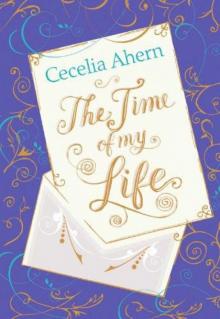 The Time of My Life
The Time of My Life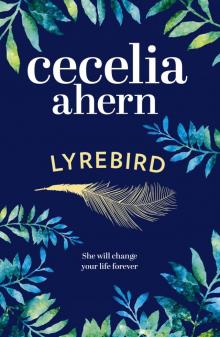 Lyrebird
Lyrebird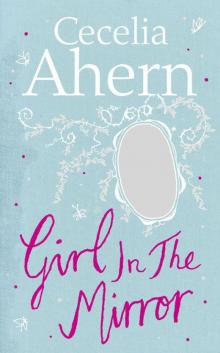 Girl in the Mirror
Girl in the Mirror Perfect
Perfect One Hundred Names
One Hundred Names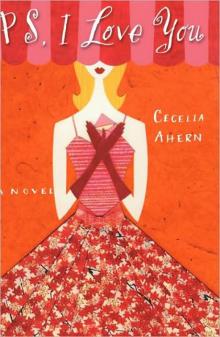 PS, I Love You
PS, I Love You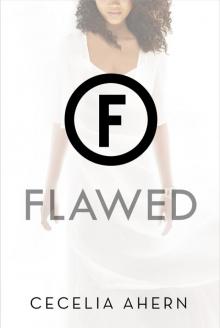 Flawed
Flawed The Book of Tomorrow
The Book of Tomorrow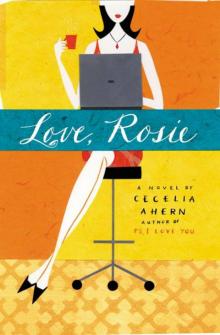 Love, Rosie
Love, Rosie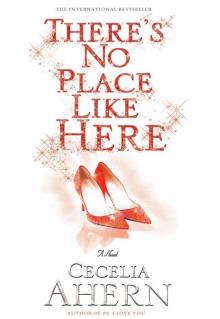 A Place Called Here
A Place Called Here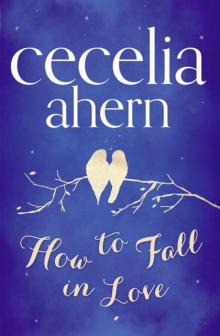 How to Fall in Love
How to Fall in Love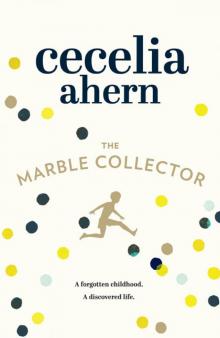 The Marble Collector
The Marble Collector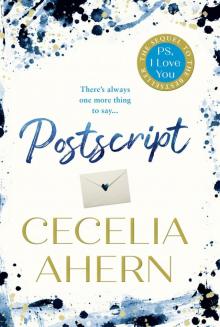 Postscript
Postscript The Gift
The Gift Thanks for the Memories
Thanks for the Memories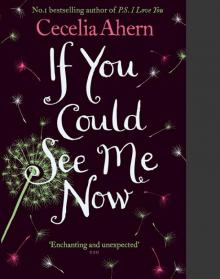 If You Could See Me Now
If You Could See Me Now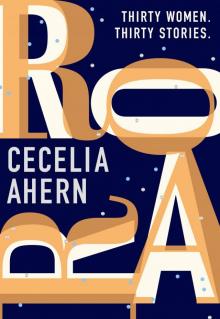 Roar
Roar Cecelia Ahern 2-book Bundle
Cecelia Ahern 2-book Bundle Girl in the Mirror: Two Stories
Girl in the Mirror: Two Stories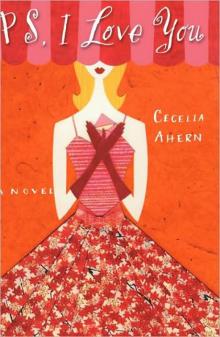 PS, I Love You: A Novel
PS, I Love You: A Novel Cecelia Ahern Short Stories
Cecelia Ahern Short Stories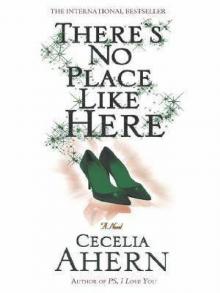 There’s No Place Like Here
There’s No Place Like Here